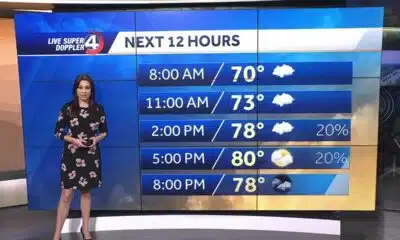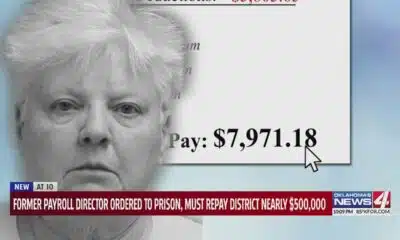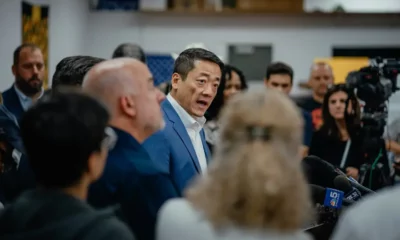News from the South - Missouri News Feed
Trump DOJ asks U.S. Supreme Court to block order to return wrongly deported Maryland man
U.S. Supreme Court pauses order to return wrongly deported Maryland man
by Ariana Figueroa, Missouri Independent
April 7, 2025
This story was updated at 4:34 p.m. Eastern.
WASHINGTON — The U.S. Supreme Court temporarily granted the Trump administration’s request Monday to block a lower court’s order to bring back to the United States a Maryland man who was erroneously deported to a notorious mega-prison in El Salvador.
The order from Chief Justice John Roberts that stays a lower court order “pending further order of The Chief Justice or of the Court” came hours after another appeals court upheld an order to return Kilmar Armando Abrego Garcia, of Beltsville, Maryland, to the United States.
Roberts’ order is not final, but pauses the lower court’s order to return Abrego Garcia while the justices reach a final decision on that order’s validity.
Abrego Garcia’s wife, Jennifer Vasquez Sura, told reporters Friday she hoped her husband would be returned to the U.S. by the midnight Monday deadline set by a federal judge.
The Trump administration made an emergency appeal to the Supreme Court on Monday, where U.S. Solicitor General D. John Sauer argued that, despite the government’s admitted error in deporting Abrego Garcia, the lower court does not have the jurisdiction to order the Trump administration to return someone who the administration argues is no longer in U.S. custody.
The appeal to the high court came within minutes of an appeals court panel unanimously upholding the order by U.S. District Judge Paula Xinis, who set a deadline of midnight Monday for the administration to return Abrego Garcia to the U.S.
Despite being granted legal protection from deportation by a judge in 2019, immigration officials detained Abrego Garcia and sent him on a March 15 deportation flight to El Salvador, where he was incarcerated at the notorious prison known as Centro de Confinamiento del Terrorismo, or CECOT.
‘The government screwed up’
A panel of three judges on the U.S. Court of Appeals for the 4th Circuit agreed Abrego Garcia’s deportation to El Salvador was a major misstep.
“The United States Government has no legal authority to snatch a person who is lawfully present in the United States off the street and remove him from the country without due process,” two judges on the panel, Robert B. King and Stephanie D. Thacker, wrote.
King was appointed by former President Bill Clinton and Thacker was appointed by former President Barack Obama.
“The Government’s contention otherwise, and its argument that the federal courts are powerless to intervene, are unconscionable,” they wrote.
J. Harvie Wilkinson III, who was appointed by former President Ronald Reagan, wrote in his option that “[t]here is no question that the government screwed up here.”
He noted that President Donald Trump’s administration has not made an effort to rectify its mistake.
“The facts of this case thus present the potential for a disturbing loophole: namely that the government could whisk individuals to foreign prisons in violation of court orders and then contend, invoking its Article II powers, that it is no longer their custodian, and there is nothing that can be done. It takes no small amount of imagination to understand that this is a path of perfect lawlessness, one that courts cannot condone,” Wilkinson said.
Order to return
On Friday, Xinis ordered the Trump administration to return Abrego Garcia.
The Department of Justice quickly appealed the decision and Xinis issued a scathing 22-page order Sunday that cited records and official statements from Trump officials saying the administration has the power to return Abrego Garcia to the U.S.
“Neither the United States nor El Salvador have told anyone why he was returned to the very country to which he cannot return, or why he is detained at CECOT,” she wrote. “That silence is telling. As Defendants acknowledge, they had no legal authority to arrest him, no justification to detain him, and no grounds to send him to El Salvador—let alone deliver him into one of the most dangerous prisons in the Western Hemisphere.”
Abrego Garcia was on one of three deportation flights to CECOT on March 15. Two flights contained 238 Venezuelans who were deported under a wartime law that is currently being challenged in another court case.
Xinis slammed the Trump administration for arguing that she had no jurisdiction to order Abrego Garcia’s return.
“For the following reasons, their jurisdictional arguments fail as a matter of law,” she said. “Further, to avoid clear irreparable harm, and because equity and justice compels it, the Court grants the narrowest, daresay only, relief warranted: to order that Defendants return Abrego Garcia to the United States.”
She noted that the two countries have an agreement to house more than 250 deported men at CECOT.
The U.S. is paying El Salvador $6 million to detain the men at the prison. Trump is scheduled to meet with El Salvador President Nayib Bukele at the White House on April 14.
In response to the district court’s order to return Abrego Garcia, the president of El Salvador, Nayib Bukele, posted a GIF of a confused cartoon bunny on social media.
Attorney placed on leave
The Department of Justice attorney who argued on behalf of the Trump administration, Erez Reuveni, was placed on indefinite administrative leave over the weekend.
U.S. Attorney General Pam Bondi said during a Fox News interview Sunday that Reuveni was placed on leave because he did not “vigorously” defend the administration.
Reuveni, a veteran government attorney, has argued for the DOJ over the course of four administrations.
During Friday’s hearing he was candid that the Trump administration had provided him little information on why Abrego Garcia could not be returned to the U.S. and that “the government made a choice here to produce no evidence.”
Last updated 3:53 p.m., Apr. 7, 2025
Missouri Independent is part of States Newsroom, a nonprofit news network supported by grants and a coalition of donors as a 501c(3) public charity. Missouri Independent maintains editorial independence. Contact Editor Jason Hancock for questions: info@missouriindependent.com.
The post Trump DOJ asks U.S. Supreme Court to block order to return wrongly deported Maryland man appeared first on missouriindependent.com
News from the South - Missouri News Feed
Urban League's back-to-school expo helps thousands of St. Louis students in need
SUMMARY: The Urban League’s back-to-school expo in St. Louis provided crucial support to thousands of students in need. Held in a drive-thru format, the event served up to 5,000 families, distributing nearly $400,000 worth of school supplies, food, groceries, toiletries, PPE, and tornado disaster relief items. Sponsored by Nike and community partners, the expo ensured children had essential tools to start the school year strong, especially important after recent severe weather devastation. Volunteers efficiently loaded supplies into cars to ensure safety and accessibility. A follow-up event on August 16 will offer free health services including exams, immunizations, and screenings.
Thousands of students get a big boost ahead of the new school year as the Urban League of Metropolitan St. Louis’ back-to-school expo returned this weekend.
St. Louis News: FOX 2 covers news, weather, and sports in Missouri and Illinois. Read more about this story or see the latest updates on our website https://FOX2Now.com
Follow FOX 2 on social media:
YouTube: https://www.youtube.com/FOX2Now
Facebook: https://www.facebook.com/FOX2Now/
Twitter: https://twitter.com/FOX2Now/
Instagram: https://www.instagram.com/fox2now/
TikTok: https://tiktok.com/@fox2now
SnapChat: https://www.snapchat.com/add/fox2now
News from the South - Missouri News Feed
Here's what Yadier Molina said on his first game as a Cardinals coach
SUMMARY: Yadier Molina, the St. Louis Cardinals’ legendary catcher, returned to Busch Stadium as a guest coach for the first time since retiring three years ago. Serving for two games against the Chicago Cubs, Molina is providing moral support and sharing his expertise with catchers and pitchers to refine their skills during the 2025 season’s final months. He expressed joy in returning home, appreciating the fans and the opportunity to mentor young players. Manager Oli Marmol and catchers Yohel Pozo and Pedro Pages praised Molina’s presence and impact. Molina also revealed aspirations to manage or coach at the major league level in the future.
The post Here's what Yadier Molina said on his first game as a Cardinals coach appeared first on fox2now.com
News from the South - Missouri News Feed
Local movie: Catching Bullets
SUMMARY: “Catching Bullets” is a powerful new documentary addressing youth gun violence in St. Louis, following community leaders and mentors working to break the cycle. The film centers on former gang member Darren Seals, who survived multiple shootings and now dedicates his life to helping at-risk youth find constructive paths. It highlights gun violence as the leading cause of death for Black males in St. Louis and emphasizes the need for community-driven change. Premiering locally on the 14th and streaming nationally on Tubi and Amazon Prime, the film aims to inspire hope, healing, and a return to caring community values.
Thursday, August 14th 24:1 Cinema
6755 Page Avenue
Pagedale, Mo 6:30 p.m.
-
Mississippi Today6 days ago
After 30 years in prison, Mississippi woman dies from cancer she says was preventable
-
News from the South - Texas News Feed6 days ago
Texas redistricting: What to know about Dems’ quorum break
-
News from the South - North Carolina News Feed4 days ago
Two people unaccounted for in Spring Lake after flash flooding
-
News from the South - Florida News Feed7 days ago
Warning for social media shoppers after $22K RV scam
-
News from the South - Georgia News Feed6 days ago
Georgia lawmakers to return this winter to Capitol chambers refreshed with 19th Century details
-
News from the South - Louisiana News Feed6 days ago
Plans for Northside library up for first vote – The Current
-
Mississippi Today5 days ago
Brain drain: Mother understands her daughters’ decisions to leave Mississippi
-
News from the South - Georgia News Feed6 days ago
29-year-old killed after driving off road in 'dangerous' section road | FOX 5 News











































